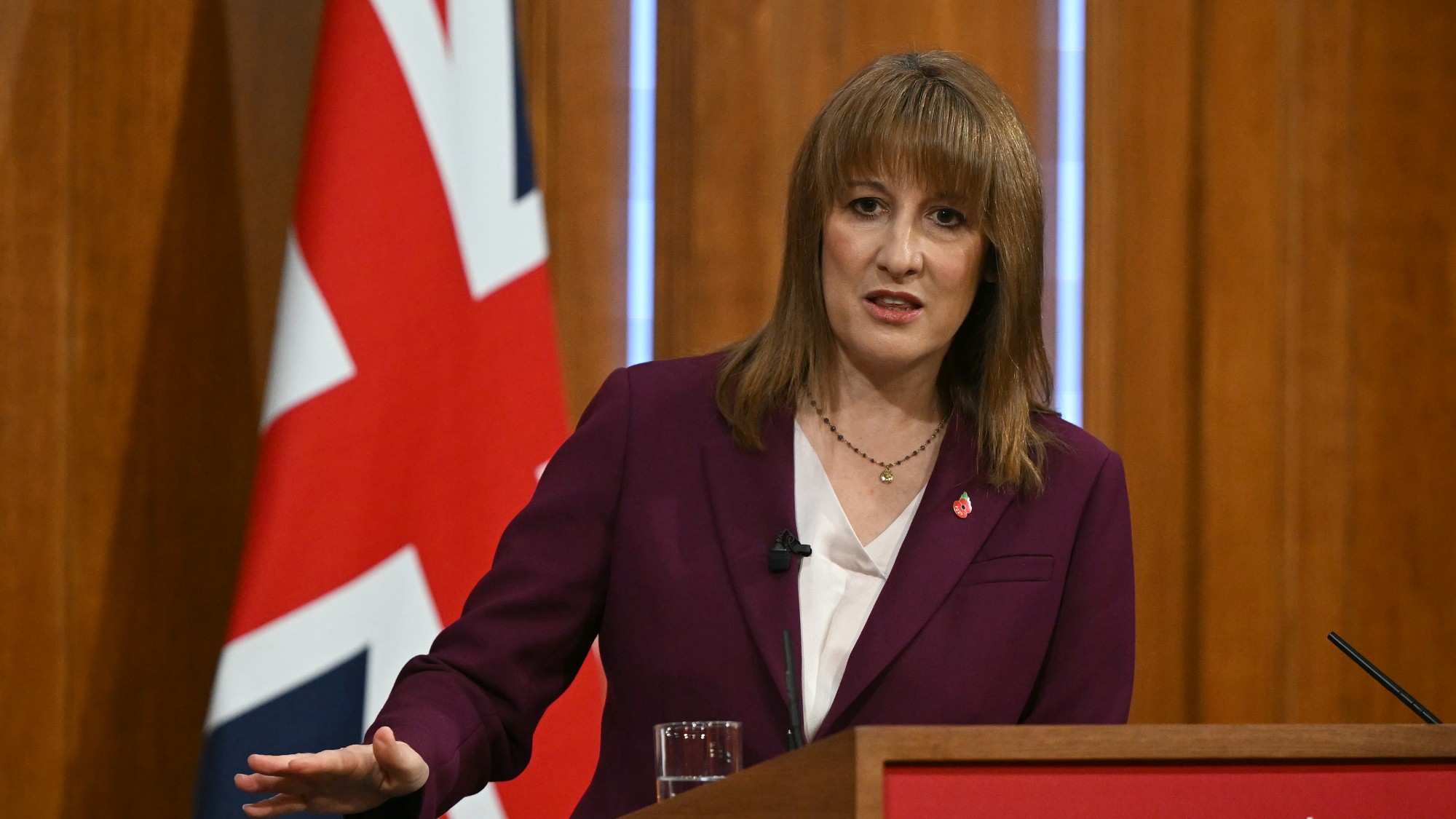Why Boris Johnson’s plan won’t fix social care
Analysis suggests cash generated by proposed tax hikes will not be enough to tackle both the NHS and wider care crises

A free daily email with the biggest news stories of the day – and the best features from TheWeek.com
You are now subscribed
Your newsletter sign-up was successful
Professor Catherine Needham of Birmingham University on why the sums behind the prime minister’s funding plan for buckling social care system don’t add up
Boris Johnson has unveiled plans for a £12bn-a-year tax rise from April 2022, to fund social care reform in England and to tackle the NHS’s Covid-induced backlog of cases.
Demand for care - from short-term needs to long-term support - is rising and levels of unmet need are soaring. Social care needs urgent investment.
The Week
Escape your echo chamber. Get the facts behind the news, plus analysis from multiple perspectives.

Sign up for The Week's Free Newsletters
From our morning news briefing to a weekly Good News Newsletter, get the best of The Week delivered directly to your inbox.
From our morning news briefing to a weekly Good News Newsletter, get the best of The Week delivered directly to your inbox.
The four nations of the UK each have their own care systems. In England, requests for social care have gone up 6% in the last five years but there has been a decrease in people getting support. Around 14,000 fewer people have received the help they need.
The announcement of extra funding intended to fill that gap should be heartening. However, the money the government is seeking is set to finance not only a social-care system reform but also an NHS rescue plan. Getting back to pre-pandemic level of NHS service alone is likely to cost almost £17bn. Critics fear that the new levy will be used up within the NHS, with little left to spend on improving social care. The research I have done on care markets and sustainable care systems highlight that these new proposals are unlikely to deliver what we so urgently need.
A complex system
Social care, which provides long-term care for people with a disability and age-related frailty, is a hugely complex system. It covers residential care, home care, day services and a wide range of community supports.
A free daily email with the biggest news stories of the day – and the best features from TheWeek.com
In the UK, most of these are provided by the private sector, in a diverse marketplace of thousands of providers and community groups. People currently pay for their own care if their assets exceed a certain level (£23,500 in England), otherwise care is purchased for them by their local council.
People are living much longer with multiple conditions that need support from the care system. Although much of the conversation about care focuses on older people, half of spending is actually on working-age people with disabilities. Families also provide a huge amount of informal care and support.
Current proposals
Johnson has been promising reform to social care since he took office in 2019 and, finally, he has announced what that will be. The plans involve a National Insurance rise for what the government is labelling a health and social care levy. They also include a limit of £86,000 to how much people will have to pay for care in their lifetime.
At the moment, there is no maximum amount that a person can pay for care. For some people with long-term conditions like dementia, the costs run into hundreds of thousands of pounds.
There is a real need for new money in the system. But of the £36bn that will be raised by this levy, only £5.4bn will go to social care, and half of that will pay for the new care cap rather than address any of the existing strains in the system.
Proposals to introduce a cap on care spending are welcome. But we’ve had a cap in law before. It was part of the Care Act 2014 and then abandoned because of concerns about the viability of implementation.
The spending of self-funders (a relatively invisible and hard to research group) would need to be monitored by local authorities so that it was clear when the cap had been reached. We don’t yet have systems in place to do that. The current proposals (a cap on spending with a sliding scale of contributions for people with assets of £20,000 to £100,000), appear to be even more complex that those attempted in 2014.
The new proposals also do nothing to address low pay for the 1.5 million people working in the care sector. They won’t improve the range, quality or adequacy of social care, a system that many people say is about meeting basic needs rather than enhancing well-being or allowing people to flourish.
For those articulating a more ambitious account of what social care reform could achieve, there is little to celebrate in the new announcements.
If the proposals make it into law - and there is a long road ahead, with potential hostility from all sides - then they will apply to people accessing care from 2023. Having paid towards a health and social care levy, many of these people will have high expectations of what they will get from social care. If the money goes to the NHS, leaving social care mired in crisis, then there may be political costs to Johnson beyond his current headache of a broken manifesto promise.
Catherine Needham, professor of public policy and public management, University of Birmingham.
This article is republished from The Conversation under a Creative Commons licence. Read the original article.
-
 ‘The mark’s significance is psychological, if that’
‘The mark’s significance is psychological, if that’Instant Opinion Opinion, comment and editorials of the day
-
 How did ‘wine moms’ become the face of anti-ICE protests?
How did ‘wine moms’ become the face of anti-ICE protests?Today’s Big Question Women lead the resistance to Trump’s deportations
-
 Currencies: Why Trump wants a weak dollar
Currencies: Why Trump wants a weak dollarFeature The dollar has fallen 12% since Trump took office
-
 The high street: Britain’s next political battleground?
The high street: Britain’s next political battleground?In the Spotlight Mass closure of shops and influx of organised crime are fuelling voter anger, and offer an opening for Reform UK
-
 Is a Reform-Tory pact becoming more likely?
Is a Reform-Tory pact becoming more likely?Today’s Big Question Nigel Farage’s party is ahead in the polls but still falls well short of a Commons majority, while Conservatives are still losing MPs to Reform
-
 Will Rachel Reeves’ tax U-turn be disastrous?
Will Rachel Reeves’ tax U-turn be disastrous?Today’s Big Question The chancellor scraps income tax rises for a ‘smorgasbord’ of smaller revenue-raising options
-
 Taking the low road: why the SNP is still standing strong
Taking the low road: why the SNP is still standing strongTalking Point Party is on track for a fifth consecutive victory in May’s Holyrood election, despite controversies and plummeting support
-
 What difference will the 'historic' UK-Germany treaty make?
What difference will the 'historic' UK-Germany treaty make?Today's Big Question Europe's two biggest economies sign first treaty since WWII, underscoring 'triangle alliance' with France amid growing Russian threat and US distance
-
 Is the G7 still relevant?
Is the G7 still relevant?Talking Point Donald Trump's early departure cast a shadow over this week's meeting of the world's major democracies
-
 Angela Rayner: Labour's next leader?
Angela Rayner: Labour's next leader?Today's Big Question A leaked memo has sparked speculation that the deputy PM is positioning herself as the left-of-centre alternative to Keir Starmer
-
 Is Starmer's plan to send migrants overseas Rwanda 2.0?
Is Starmer's plan to send migrants overseas Rwanda 2.0?Today's Big Question Failed asylum seekers could be removed to Balkan nations under new government plans